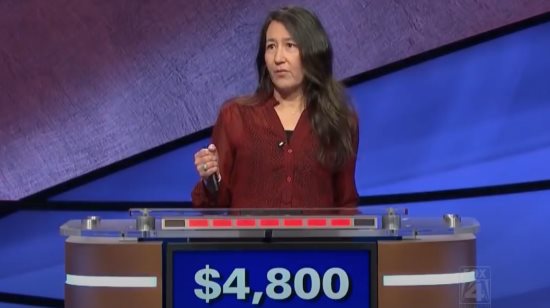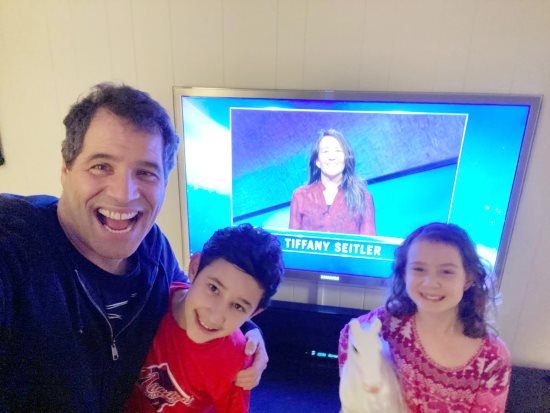 | | | Tiffany Seitler on the Feb. 10 episode of "Jeopardy." Photos provided | | | | | | It will likely be some time before Tiffany Seitler will forget that the Hindenburg was named after the second president of the Weimar Republic.
 Why should the Moraga mom of two care about the naming of the German passenger ship destroyed in a fire back in 1937? Because that was the final question on the Feb. 10 episode of "Jeopardy" - and the question that took her from second place to third on the popular TV game show. Seitler acknowledges that she had no idea the answer to that question. "As friends pointed out, I went down like the Hindenburg," she laughingly reports.
Why should the Moraga mom of two care about the naming of the German passenger ship destroyed in a fire back in 1937? Because that was the final question on the Feb. 10 episode of "Jeopardy" - and the question that took her from second place to third on the popular TV game show. Seitler acknowledges that she had no idea the answer to that question. "As friends pointed out, I went down like the Hindenburg," she laughingly reports.
 Apparently, there's a whole mathematical strategy to betting in final "Jeopardy." Seitler admits that her final bet was perhaps not as carefully thought out as it should have been. With $8,000 she bet $7,900. "At that point, it really didn't matter," she notes. "The third place contestant and I were so far behind the champion, there was no way we were going to beat him. I probably should have bet a little less so I could have at least come in second. Having no idea what the question was, I still had confidence that there was a chance I'd get it right and at least get something." She did get something - $1,000 instead of the second place prize of $2,000.
Apparently, there's a whole mathematical strategy to betting in final "Jeopardy." Seitler admits that her final bet was perhaps not as carefully thought out as it should have been. With $8,000 she bet $7,900. "At that point, it really didn't matter," she notes. "The third place contestant and I were so far behind the champion, there was no way we were going to beat him. I probably should have bet a little less so I could have at least come in second. Having no idea what the question was, I still had confidence that there was a chance I'd get it right and at least get something." She did get something - $1,000 instead of the second place prize of $2,000.
 What she absolutely did get was the opportunity to achieve a long-standing goal. In fact, while Seitler says she's taken the written test numerous times, this was the third time she actually moved on to the next level. Her first time was in 2004 and her second attempt was about 10 years later. Both times she got through to the second round of auditions but never got the call to be on the show. The third time - spring 2020 - was apparently the charm.
What she absolutely did get was the opportunity to achieve a long-standing goal. In fact, while Seitler says she's taken the written test numerous times, this was the third time she actually moved on to the next level. Her first time was in 2004 and her second attempt was about 10 years later. Both times she got through to the second round of auditions but never got the call to be on the show. The third time - spring 2020 - was apparently the charm.
 According to a 2019 champion who wrote on social media, she was told that about 80,000 people took the online "Jeopardy" test, which is the first step in qualifying. Approximately 2,500 people are invited to audition and 250 will actually appear on the show.
According to a 2019 champion who wrote on social media, she was told that about 80,000 people took the online "Jeopardy" test, which is the first step in qualifying. Approximately 2,500 people are invited to audition and 250 will actually appear on the show.
 The process to apply has changed because of COVID-19. In 2004 and again in 2015, Seitler was invited to the second round game play audition at a San Francisco hotel months after completing the 50-question, timed online test. "Both times, I sat there with hundreds of other potential contestants," Seitler recalls. They are divided up into small groups, given another written test and then stand at a podium with two others, with a buzzer, to play a pretend game. "The producers chatted with us, much like they do on the show, for about a minute and that's it. Our application sits in their file for 12 to 18 months."
The process to apply has changed because of COVID-19. In 2004 and again in 2015, Seitler was invited to the second round game play audition at a San Francisco hotel months after completing the 50-question, timed online test. "Both times, I sat there with hundreds of other potential contestants," Seitler recalls. They are divided up into small groups, given another written test and then stand at a podium with two others, with a buzzer, to play a pretend game. "The producers chatted with us, much like they do on the show, for about a minute and that's it. Our application sits in their file for 12 to 18 months."
 Last spring, Seitler took the online anytime test and received a call in November, inviting her to the second round audition via Zoom. The process was the same, she reports, only virtual. But this time, her application didn't just sit in a file somewhere. She got the call. She'd made it. The taping was scheduled for two weeks later.
Last spring, Seitler took the online anytime test and received a call in November, inviting her to the second round audition via Zoom. The process was the same, she reports, only virtual. But this time, her application didn't just sit in a file somewhere. She got the call. She'd made it. The taping was scheduled for two weeks later.
 "Jeopardy," like everything else, has been changed by the pandemic. The day before the taping, Seitler went to the LA studio for a COVID test. On her scheduled day, she sat in a theater-style waiting area several seats away from her neighbors, all wearing masks. The makeup person couldn't touch her so she was given powder, a brush and instructions on what to do. The sound technician couldn't place the microphone on her so, again, she was handed the equipment and told what to do. The podiums are placed further apart than pre-COVID and the host, in Seitler's case, Ken Jennings, never gets closer than six feet from the contestants.
"Jeopardy," like everything else, has been changed by the pandemic. The day before the taping, Seitler went to the LA studio for a COVID test. On her scheduled day, she sat in a theater-style waiting area several seats away from her neighbors, all wearing masks. The makeup person couldn't touch her so she was given powder, a brush and instructions on what to do. The sound technician couldn't place the microphone on her so, again, she was handed the equipment and told what to do. The podiums are placed further apart than pre-COVID and the host, in Seitler's case, Ken Jennings, never gets closer than six feet from the contestants.
 With travel restrictions in place, most recent contestants are California residents. But, Seitler says, in an attempt to perhaps sound more global, she was not introduced as being from Moraga but, instead, "originally from Garfield, New Jersey."
With travel restrictions in place, most recent contestants are California residents. But, Seitler says, in an attempt to perhaps sound more global, she was not introduced as being from Moraga but, instead, "originally from Garfield, New Jersey."
 While some "Jeopardy" contestants admit to preparing by watching previous shows and studying a myriad of topics, Seitler states that she crammed on basic facts but "you can study all day. There's just no way you can possibly know the answers to all the questions."
While some "Jeopardy" contestants admit to preparing by watching previous shows and studying a myriad of topics, Seitler states that she crammed on basic facts but "you can study all day. There's just no way you can possibly know the answers to all the questions."
 She did determine - after the fact - that "if I could have buzzed in for every question I knew, I could have done a lot better." There's definitely an art to buzzing in, Seitler says. "If you buzz in too early, you're locked out for a second. Too late and, well, it's too late." One of the things the producers rehearse with the contestants prior to the actual taping is working the buzzer.
She did determine - after the fact - that "if I could have buzzed in for every question I knew, I could have done a lot better." There's definitely an art to buzzing in, Seitler says. "If you buzz in too early, you're locked out for a second. Too late and, well, it's too late." One of the things the producers rehearse with the contestants prior to the actual taping is working the buzzer.
 Seitler may not have been a big winner, but she had a once-in-a-lifetime experience and she got to cross off one bucket list item.
Seitler may not have been a big winner, but she had a once-in-a-lifetime experience and she got to cross off one bucket list item. |

